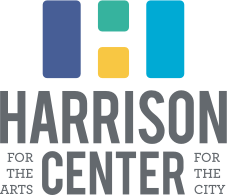Honoring the Life of William "Bill" Rasdell
Portrait of William “Bill” Rasdell by Abi Ogle
On Friday, February 2nd, from 6-9 the Harrison Center will host a celebration of life in the gym to honor our friend William “Bill” Rasdell who passed away in November.
Rasdell was a digital artist and photographer who holds a special place in our community’s history as the very first artist to have a studio at the Harrison Center. He was also a Greatriarch of the Martindale-Brightwood neighborhood and leaves behind a legacy of using photography to tell complex stories.
Some may say Rasdell’s journey of becoming a photographer was by chance, but the month before his passing, when asked how he discovered his passion for photography, Rasdell claimed it was “meant to be.”
It was in Rasdell’s early adulthood that he received his first camera. One morning, while living in New York City, Rasdell was riding his bike in Central Park and noticed a man with a flat bike tire. Rasdell stopped to make sure the man was okay and assisted him. It just so happened that this man owned the largest camera shop in the country and gave Rasdell a camera as a thank-you for his assistance. Rasdell instantly fell in love with photography and pursued it as a passion and career for the rest of his life. Ever since then, Rasdell became a pioneer in the digital art field and had a significant impact on people across the world through his art.
William “Bill” Rasdell, 2023
From editorial photography to exhibiting his work locally and internationally, throughout the course of his career, Rasdell would earn a significant amount of recognition. Rasdell also had a wide range of teaching experiences and founded the My City, My World project, a youth program that partners kids from Indianapolis to other kids across the world using photography to share cultures and language.
At the core of Rasdell’s work were issues related to migration as a transforming agent in cultural evolution. Rasdell’s images examined the ways that ethnic convergence can enrich cultures with foods, religions, languages and the arts just as it can erode the foundation of a society through overpopulation, unemployment, homelessness, xenophobia and war.
Rasdell was known for being a member of the arts community that connected people. His life and work will be remembered by people across the globe.
Jeremy Efroymson, philanthropist and supporter of Rasdell’s work, remembers Rasdell as “a super kind person who everyone liked.” Efroymson remains impacted by spending time with Rasdell on a trip to Cuba and in his studio, which was a known spot for Rasdell to offer visitors rum and share his love of jazz. “I remember going by his studio on First Fridays and he was always welcoming and had a crowd there,'' says Efroymson.
William “Bill” Rasdell, 2022
Speaking on Oral History and Genealogy at the Center for Black Culture and Literature in Indianapolis
Trent Cowles, Harrison Center board member and collector of Rasdell’s work, became an incredibly close friend of Rasdell’s through the connection of Rasdell’s art. Cowles has one of Rasdell’s pieces in every room of his house, and holds a great amount of respect for Rasdell as an artist and friend. Cowles describes Rasdell as “Inventive, intuitive, and creative. He never was afraid to change and try new things, even if it didn’t sell– He wasn’t creating to sell, he created to communicate and tell stories. That was a part of his sincerity– He created what was right for him and the stories that needed to be told.”
“Success happens when preparation meets opportunity,'' says Cowles. “Rasdell was always ready to seize opportunities. He grew a career off of that. When new tools came along he used it to create and was a pioneer in digital artwork.”
Artura Silva, a past Harrison Center artist considered Rasdell to be a mentor in his life and his creative practice. “He [Rasdell] was extremely generous. There are dozens, if not hundreds, of people that he mentored over his lifetime. I met Bill by being near his studio. He asked one day, ‘Do you like rum? Do you like hanging out?’ From that point on we became really good friends. We would come into each other's studios once a day and we developed a long, excellent friendship. He taught me so much about not just technical things about photography but taught me a lot about being an artist. He has had a tremendous impact on my life and we were close friends for more than 20 years.”
William “Bill” Rasdell
Rod Trabue, Indianapolis-based artist and Rasdell’s second cousin, discusses how expansive Rasdell’s creative practice was. “His photography got him into travel. He was always an independent person, a free being. He started doing these exposés on the lost tribe of Israel, he was documenting the migration of African jews.” This project took Rasdell all across the world, including; Ghana, Nigeria, Zimbabwe, Uganda, and Cuba– which he traveled to more than 30 times in his life. Rasdell even led trips to Cuba with the Harrison Center and inspired other artists to return on their own.
Rasdell’s legacy will continue to live on in the arts communities that he was involved in.




